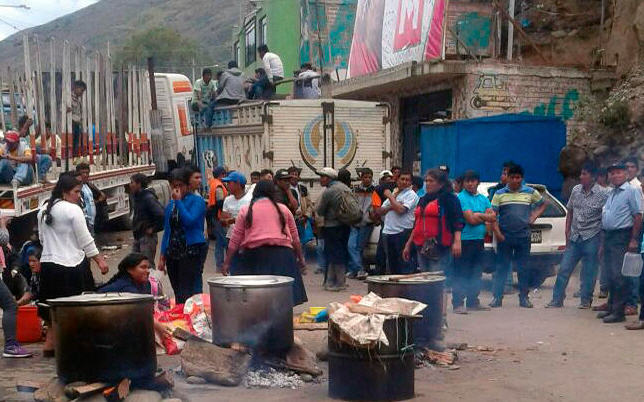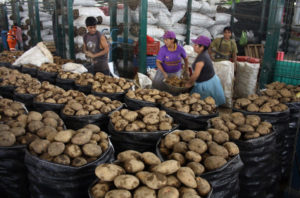
Potato farmers in several regions of the country began a 72-hour strike on Jan. 9 to demand emergency measures in the sector and to protest the drop in potato prices. Roads were blocked by protestors in the central and southern Andes, in Junin, Pasco, Ayacucho, Huancavelica and Huanuco. And also on the coast in Arequipa and Moquegua.
Farmers are protesting the sharp drop in potato prices, which they blame on the importation of pre-cooked potatoes, supplied to the restaurant industry and the fast-food franchises that comply with their chain’s standardization rules.
The average price of locally-grown potatoes is currently at S/.0.10 per kilo, against prices even last year of around S/.0.80/kg.
“The imported pre-cooked potatoes come in at S/.0.70 per kilo, and they’re brought by huge companies from Holland,” said Jesús Aliaga, president of the Cunas Basin farmers in Chupaca, Junin, to La Republica daily. Precooked potatoes are also imported form Belgium, the United States and Canada. “The large chicken restaurants buy them and stop buying domestic production.”
But the real cause for the drop in prices is an overproduction in 2017, according to Juan Manuel Benites, minister of Agriculture in the final two years of the Humala administration (2014-2016). In an interview on RPP radio, Benites said the government had failed to share production trend information with farmers. “There was a 5% increase in production but the demand did not grow, and that is reflected in the prices.”
Agrodataperu and the national statistics institute, INEI, report that only 32,000 tons of pre-cooked potato were imported in 2017, representing 0.7% of national production, which in 2016 was 4.5 million tons. Precooked potatoes have been imported for over a deacade and their use remains primarily limited to the fast food restaurants.

When potato prices are good in one year, “that encourages more farmers to plant or increase their crops,” said Fernando Eguren, president of the Peruvian Center for Social Studies, CEPES. “The result is usually an overproduction and the consequence is a drop in prices. The following year, fewer farmers are encouraged to produce potatoes or they reduce the area they use for this crop. This lower production causes prices to rise. And so the cycle continues.”
The new minister of Agriculture, Jose Arista, sworn in only 24 hours ago, faces his first challenge with this strike and was expected to be meeting with leaders of the farmers’ guilds today. Their demands, besides a government ban on imported precooked potatoes, include a larger budget for the sector for projects to increase technical assistance, irrigation canals and reservoirs, and options for industrialization for processing and by-products.





